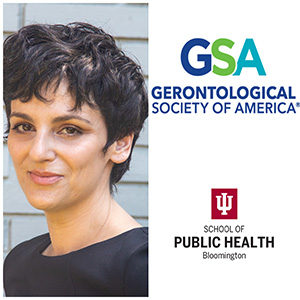For Indiana University School of Public Health-Bloomington (SPH-B) Dean’s Eminent Scholar and Associate Professor Nicole Werner, Ph.D., teamwork is key to her research on caring for people living with Alzheimer’s disease and related dementias (AD/ADRD).
Having recently been nationally recognized for the Margret M. and Paul B. Baltes Award by the Gerontological Society of America (GSA), which spotlights “outstanding early career contributions in behavioral and social gerontology,” Dr. Werner points out that all her work has been made possible through vital collaborations with caregivers, community partners, and industry partners.
"For me, the joy in my work is working with others, and although the award is going to me it is such a team approach," shares Dr. Werner, a faculty member in the SPH-B Department of Health & Wellness Design. "I am very passionate about addressing the challenges that older adults face, particularly those who have dementia—as well as the people who partner with them in care."
Dr. Werner’s background is in Human Factors Engineering, and she has in recent years been applying her research field toward the area of gerontology, receiving several grants to develop a variety of caregiver tools including an R43/R44 Fast Track Small Business innovation Research (SBIR) for "Design, Development, and Validation of an AI-Enabled Legal Planning and Financial Management Training Solution for ADRD Caregivers."
Dr. Werner explains that the AI program for legal and financial management is being field tested nationwide with 80 caregivers of all demographics. In partnership with colleague Drew Pickett, Ph.D. who secured a supplemental grant from the National Institute of Aging (NIA), an additional 30 who identify as sexual and gender minorities (SGM) were added for a total of 110.
"We are getting people to use it in their lives and then tell us what’s working well and how we can make it better, while also validating the AI component," says Dr. Werner. "We worked carefully with the caregivers to design this tool—we facilitated it, but they designed it."
AI was chosen as a development option due to the highly diverse needs of the caregiver population in the subject of legal and financial planning. Dr. Werner emphasizes the importance of the collaborative component, stating that she initially envisioned the AI tool to be more educational, whereas the feedback received from caregivers sent a very different message.
"Sometimes people look for information and it isn’t specific enough for their situation…or they are overwhelmed, and they don’t know how to find the piece they need because there is so much to sift through," says Dr. Werner. "The caregivers didn’t want more information; they wanted [the program] to tell them what to do and give them support for getting things done."
The AI program runs on the recommender system—similar to ones used on retail websites like Amazon—that assimilates data on people with similar characteristics such as location and sociodemographics and offers options from there. It was built based on the results of a large nationwide survey assessing caregivers’ legal and financial planning needs and is now undergoing algorithmic refinement.
"We want to know, was that recommendation appropriate for the individual, and if not, why not?" says Dr. Werner. "Being an SBIR commercialization grant, it is really key that we can take what we learn from this study and put this to scale to get it out into the hands of the public."
Dr. Werner credits Richard Holden, Ph.D., chair of the SPH-B Department of Health & Wellness Design and Dean’s Eminent Scholar for leading the nomination for the GSA award; as well as her academic colleagues Sara Czaja, Ph.D. at Weill Cornell Medical College; Joseph Gaugler, Ph.D. at the School of Public Health, University of Minnesota; Wendy Rogers, Ph.D. at the College of Education, University of Illinois Urbana-Champaign; and Jennifer Wolff, Ph.D. at Johns Hopkins Bloomberg School of Public Health.

"Nicole’s work is an inspiration to us because it addresses important public health needs in novel ways," says Dr. Holden. "She is nationally recognized as an innovator for her research with AI, dementia caregiver networks, and inclusive approaches to health services. Mentees and colleagues alike seek out Nicole to learn how to achieve better health by design."
Two additional nominators—Linda Haack and Heather Janes—are community partners/caregivers with whom Dr. Werner has worked closely.
"I do this for the community, and bringing their voices into the work we are doing is something I am passionate about," says Dr. Werner. "Partnering with caregivers in research and to co-design solutions—and having them support my nomination—makes me very happy."
This award has inspired Dr. Werner to continue collaborating with caregiver partners to identify challenges and co-design the A-SHIFT healthcare system toolkit so that caregivers are set up for success when their loved ones with dementia return home from a hospital stay.
"There are a lot of barriers for family members making sure the person with dementia is getting the care they need…but where we are really falling short in our healthcare systems is making sure those care partners are adequately prepared and able to take on all the care activities once the loved one goes home," says Dr. Werner. "Even a small change on any of these fronts, according to my care partners, can make an incredible difference."
For more stories about SPH-B students and faculty making a big difference both locally and worldwide, visit go.iu.edu/48bx.


